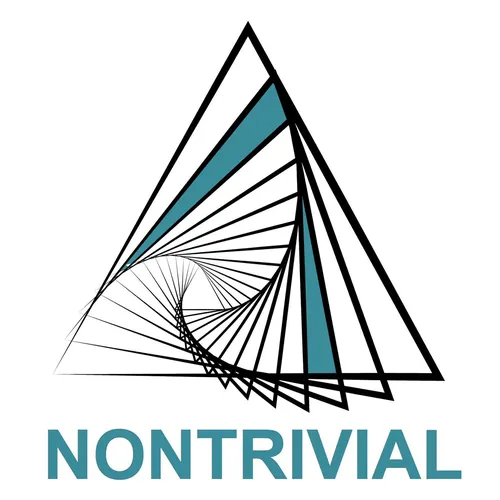
NonTrivial
A podcast about the patterns that exist at the intersection of science, philosophy and complexity, and how these speak to universal principles related to skills, growth and life.
- Update frequency
- every 9 days
- Average duration
- 37 minutes
- Episodes
- 111
- Years Active
- 2020 - 2025

Nipping Temptations in the Bud
Temptations are things we desire to do, but are also things we deem wrong or unwise. Temptations take us away from who we want to be in life. Temptations start off harmless, but have a tendency to gr…

Collaborating Doesn't Mean Being Nice
Collaboration is good, but friction is needed to solve tough problems as a group. The quality of information depends on stark individualism, rather than some engineered collaboration based on excess …

Most Barriers are Imagined: Turning Intention into Lifestyle
When we think about the things we want to accomplish, we often frame them in terms of the barriers we need to pass. But this isn't the case for things that comprise our lifestyle. When something is p…

Do Many Things to be Good at Any One Thing
We are often told that if we want to be good at something we should focus more. But a single (real world) task has multiple facets that must be honed, and you cannot learn those facets from the task …

The Wise Don’t Silence Their Opponents
In 2014 there was a debate between Bill Nye and Ken Ham regarding whether or not Creationism is a viable explanation for earth's origin. Regardless of which side you agree with, there was what I cons…

Rewarding Dumbness: How Modern Society Filters Away Intelligence
Human society has always applied filters, to select who should be in a particular group. This is both evolutionary and required for good social dynamics. But we also apply filters institutionally, us…

Turning Truth into Technique
As we go through life we notice things about our ability to perform, like when things work and when they don't. But most people tend to leave at that, hoping they'll gravitate towards the better part…

"Discipline" is Really Just One's Environment
In this episode I challenge the idea that discipline is what's needed to achieve successful outcomes. Discipline requires we act against our instincts and willpower. Anything so opposed to our natura…

Missing What Matters: How Today's Books Lack Authenticity
Many of us are avid readers, because reading helps us learn about important topics, and more importantly compels us to create things ourselves.
But today's nonfiction is loaded with so many reference…

Bewitched by AI: Showing is Not Creating
AI is getting impressive. But being impressed is not an objective measure of progress. For a technology to truly bear the mark of innovation it must enable us to create new things. I argue that few p…

Creativity Demands Less Options: How Structure Compels Originality
In this episode I argue that true creativity demands that we have less options available in our attempt to build something new. I first acknowledge that creativity requires freedom, and freedom inclu…

Neuro-Nonsense: The Folly in Trying to Find the Location of Behavior
In this episode we look at how neuroscience tries to explain human behaviour by identifying specific regions in the brain. I'll discuss how such targeted approaches are problematic in science, and ho…

Contributing Without Compromising: How to Meet Expectations, Our Way
We need to contribute to society in order to survive, and that means having a job. But many people hate their job, and find it difficult to feel fulfilled while earning a living. I believe there is a…

The Structure of Intuition: Recognizing the Cost of Precision
In this episode I argue that intuition is more rigorous than precisely defined arguments, such as those constructed using mathematics. I talk about the cost of precision in real-world situations, off…

Let Nature Choose Your Deadlines: How Focusing on Structure Beats Focusing on Time
In this episode I discuss deadlines, and the critical difference between the artificial ones we create to manage our lives, and the real ones dictated by nature.
I discuss how our manufactured deadlin…

Thinking Before Eating: A More Rigorous Heuristic
In this episode I take a look at the notion of quality. How to define it and how to assess it in real world situations, and I’ll discuss what I think is a useful heuristic for sizing up both things a…

Symbols, Connections and the Role Knowledge Plays in Intelligence
There are 2 main approaches to AI (symbolic vs connectionism), and they are very different in how they think about producing intelligence in the machine.
One approach believes in programming what we …

The Real versus True You: How Constraints Lead to Freedom
The modern narrative frames structure and systems as oppressive. As though we should never be held back by systems that interfere with our ability to express our unique selves.
But being ourselves at …

The Dose Makes the Poison
We all depend on our environment to survive. We need food, water, friends, family, coworkers. We participate in the economy, pay for entertainment, post on social media. But all these things bear the…

Season 4: Announcement
Hey everyone, Sean here from NonTrivial. Just a quick announcement for the upcoming season 4. In season 3, I used a book to anchor our conversations. I did this so that I could show how many of the c…